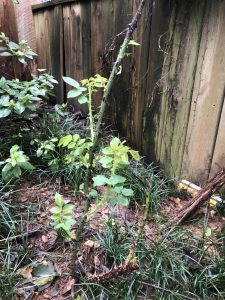Psalm 139:13–16 (NIV) reads,
For you created my inmost being; you knit me together in my mother’s womb. I praise you because I am fearfully and wonderfully made; your works are wonderful, I know that full well. My frame was not hidden from you when I was made in the secret place, when I was woven together in the depths of the earth. Your eyes saw my unformed body; all the days ordained for me were written in your book before one of them came to be.
This has become one of the most comforting verses for my life. I realize I have, perhaps like many others, attempted to circumvent God’s plan by inserting my own desires or, worse, misread how he wants to use the gifts he gave me to propel his kingdom forward.
I’m not sure my plans are important anyway. It’s not that I don’t think we should plan for our future. Of course we should. Should we dream big dreams? Of course we should. But we should pray for God’s blessing that the aspirations we have coincide with his plans.
But more importantly, maybe my job is to simplify my life by being open to, recognizing, and responding to the next opportunity he puts in front of me to further his kingdom. Maybe that’s always been his real plan.
My friend Greg Murtha called that “intentional living.” Greg and I went years without speaking in person, but we stayed in contact with each other through social media. Greg went to heaven last year after a courageous battle with cancer. He went through more than seventy rounds of chemo. He posted almost daily about his journey, and his writings were perhaps some of the most compelling, God-honoring, joyous posts I’ve read. His focus didn’t center on whether he would live or die. He believed our lives are an extension of heaven, and therefore, we should celebrate.
One of his last posts read,
What were we celebrating? As I have shared before, one of the Murtha Family Values is to celebrate. We believe if you have something to celebrate, then you should do just that … and you should do so today … not tomorrow (we’re not promised tomorrow). We also believe if you can go big with the celebration, then go big.
When Greg posted something, people responded with all the things you would think. Sweet and authentic words. Some were prayers. Some were sincere wishes for healing and health. I know they meant a lot to Greg.
I kept trying to think of original things to say when I read a post of Greg’s. I wanted to say something that would make people stop and admire some pithy, catchy phrase I penned, which, thank God, struck me as anything but authentic. My responses became less about my friend Greg and more self-serving.
So I began to respond to every post with nothing more than “I love you.”
One day, when I was working at a package-shipping store, I was exhausted from staying up most of the night before with my pooch. Iggy had just endured emergency surgery from ingesting the stuffing from my comforter. I would have thought after one bite, he would’ve thought, This doesn’t taste nearly as much like cotton candy as I’d hoped, and stopped eating. But apparently, he chose to make sure none of the other dogs got any of it. After that ordeal, all I wanted was to go home and get a good night’s sleep.
All of a sudden, the front door of the store opened, and a guy walked in, talking on his phone and carrying a drop-off package. I heard him say, “Yeah, Greg. Hold on.” He looked up at me and said, “Tim?” I didn’t recognize him. “Greg, you’re not going to believe this. I’m dropping off a return for Laura, and Tim Holder is working here.” I clearly heard Greg scream through the phone. The guy in front of me said, “Tim, I’m Zach Murtha, Greg’s brother.”
Zach pressed the speaker button, and we were all yelling and catching up for a few minutes. Customers stared, and at the end of the conversation, Greg, as was Greg’s style, said, “Tim, you are a great man.”
I looked up to see Zach’s eyes filled with tears, as were mine. I could barely speak as I said, “Greg Murtha, I love you.”
The twists and turns, the anfractuousness of life, shouldn’t surprise us. They happen every day, minute by minute. We either can be anxious about them and live in fear of what’s around the next bend or can recognize them for what God meant them to be: moments of pure affirmation that he is, in fact, in control. That specific moment was an opportunity for us to choose how we would respond before we were even born. It is not now, nor has it ever been about how much we can handle. It’s about how we respond to every opportunity we are given to show his power and love.
A few years ago, I spent Thanksgiving Day with my precious mom and my brother-in-law and sister. We laughed a lot. We ate lunch with Mom at her retirement village, surrounded by quite a few people we had grown up around.
One of those lifelong friends was Fayetta Murray. She was ninety-one years old and as smart as a whip. She’d spent many years as an English and literature teacher at the junior high school I attended.
There have been a few teachers in my life whom I look back on and can emphatically say they made a significant impact on my life. Mrs. Murray is one of those teachers.
I was terrified when I moved to Searcy. But Mrs. Murray would smile her great big smile, and I wasn’t afraid. She helped me know I wasn’t weird or a nerd for loving books. She helped me trudge through and process Great Expectations. She marched our class three blocks to the Rialto Theater on the square in Searcy, catty-corner to the old courthouse, to watch Romeo and Juliet. I think of her when I pull out Silas Marner every few years to reread. She rode the bus with us to the high school to watch their theatrical production of The Curious Savage, in which her daughter, Peggy, had a notable character role. It was not uncommon to see Mrs. Murray floating through a crowded hallway lined with students and lockers with a sweet, serene smile on her face and a faraway gaze in her half-closed eyes, waving her bone-thin arms up and down as if she were a butterfly in flight.
One day in her literature class, she passed out the exams precisely and methodically, old wooden desk by old wooden desk. I’m assuming she could tell if someone was hiding cheat notes that she would be able to confiscate. One of the guys in class was wearing a necklace made entirely of bones. I don’t remember if they were plastic or real bones, but they were definitely bones. Without missing a step, Mrs. Murray placed the test neatly on his desk, leaned down, and whispered, “Anyone we know?”
There was another day, however, when Mrs. Murray was hurt. On that particular day, Mrs. Murray was the duty teacher in the lunchroom. She made a decision to correct a student for behaving badly. That exchange infuriated the student, who began yelling horrible things toward Mrs. Murray. The insults hurled toward her were so painful that she ran from the lunchroom in tears.
It broke my heart. I sat down outside the band room and wrote a note to tell her that I was sorry she was hurt. I climbed the stairs to the second floor of the old school building, where we were strictly forbidden to go during lunchtime; sneaked into her classroom; and placed the note on her desk.
Honestly, I don’t remember what I said in the note. I only remember that precious lady was wounded, and it wasn’t right. I left the note on her desk and sneaked away.
In the years—decades—since then, there have been a few times when I was privileged enough to run into Mrs. Murray, even at the funeral of a classmate’s mom, when she reminded me of that note.
I find it amazing that the smallest things, the slightest word of affirmation and comfort for a hurting heart, can make such an eternal impact. It’s incredible that the anfractuosity of life—this catawampus, serpentine, winding, curving journey—can still give us moments of absolute clarity.
We often spend way too much time feeling guilty for all the hurtful things we’ve done or said, when in fact, there are moments when we get it right.
Today I’m thankful for this sweet, precious lady who took the time to invest in me. One of my many dreams for heaven is to sit with Fayetta Murray, C. S. Lewis, Greg Murtha, and Jesus and just hang for a while.
Psalm 136 (MSG) says,
Thank God! He deserves your thanks.
His love never quits.
Thank the God of all gods,
His love never quits.
Thank the Lord of all lords,
His love never quits.
Thank the miracle-working God,
His love never quits.
The God whose skill formed the cosmos,
His love never quits.
The God who laid out earth on ocean foundations,
His love never quits.
The God who filled the skies with light,
His love never quits.
The sun to watch over the day,
His love never quits.
Moon and stars as guardians of the night,
His love never quits.
God remembered us when we were down,
His love never quits.
Rescued us from the trampling boot,
His love never quits.
Takes care of everyone in time of need.
His love never quits.
Thank God, who did it all!
His love never quits!
I heard that Mrs. Murray, at the age of ninety-four, went home to see Jesus face-to-face. I love knowing she will be there to meet me when it’s my turn.
Thank God for the opportunities and for the bends, curves, twists, and turns in this beautiful, anfractuous life that beckons us to respond to him and others. It’s true. His love never quits.
You might write a note today that will be remembered forty-five years from now, making an eternal impact on a wounded friend. You might look at others, knowing nothing of their lives; speak a word of love and affirmation that will change the course of their journey; and not recognize the significance of that moment on this side of the veil.
Watch for the moments. They are there. Recognizing them and responding to them is our God-given job, right, and joyous privilege. In every exquisitely anfractuous moment of our lives, we are given another chance to say, “I love you.”






